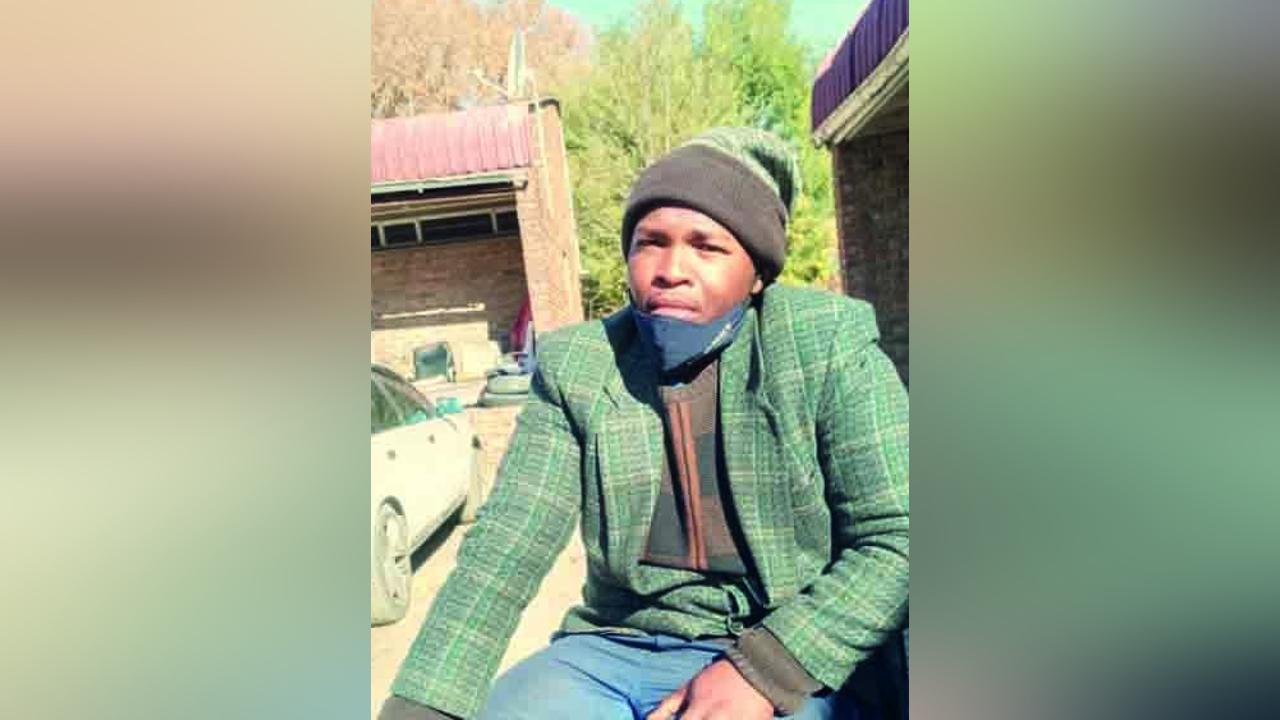Africa-Press – Lesotho. IT is not easy to tell if Tšokolo Lillane’s niece Moroesi’s mental illness has been ignited by her sniffing of glue or the troubles in her marriage. Lillane says the niece started sniffing glue shortly after breaking up with her husband and the family realised that she had a serious mental illness that needed immediate attention.
Moroesi, 25, is a widow who was married in her mid-teens when she was just in primary school before the separation. She is now a well-known glue sniffer in the streets of Maseru.
She is no different from many other mentally ill people going up and down in the streets, some semi or totally naked while others wear torn and dirty clothes and feed on leftovers from dustbins.
Lillane suspects that her niece’s early marriage contributed to her depression and she took refuge in glue sniffing, unfortunately making her mental illness worse.
“Returning from marriage, she resorted to glue,” Lillane said.
She said the family has not asked Moroesi why she is sniffing glue because when she is high she is unapproachable and when she is sober she isolates herself and does not want to talk.
“It’s very heartbreaking and she really needs help to stop that,” she said.
Lillane said it seems easy for her niece to get money to buy glue when she is in Maseru unlike when she is back at their rural home where she struggles to get money.
“She looks stable, normal and behaves like any other person when she is at home unlike here where she roams the streets and hardly sleeps at home,” said Lillane.
Moroesi is known for asking money from passers-by in the streets, telling lies that she lives with her grandmother with nothing to eat. Good Samaritans give her money and food parcels unaware that she uses the money to buy glue while she sometimes and throws away the food they give her.
Lillane said they tried but failed to find help for Moroesi. “We approached Blue Cross but we couldn’t meet their requirements because some of the things they wanted we didn’t have hence she was never assisted,” she said.
Blue Cross Society, a non-governmental association whose non-profit business is to help drug-addicts, required a referral letter from a doctor. Lillane said they have also tried to take Moroesi to doctors several times but all their efforts have been in vain.
“She would disappear for days each time we told her we are going to a health centre,” she said.
“It’s sad how she lives her life loitering in the streets without even taking a bath.
It’s not nice to see her like that,” she said. She said her grandmother tried to bring Moroesi back home without success. “She would come back but she would go missing again after a few days,” said Lillane.
“We are often worried about her whereabouts and it’s very stressful.
”
Unlike Moroesi, Tšepo Majoro managed to get treatment for his mental problems with the support of his family and he is currently on the verge of recovery.
He said when he was doing his third year at the National University of Lesotho (NUL), he decided to get married and he was already expecting a child. He said he went back to do his final year but he hated school by then.
“Financial struggles in my family put a lot of pressure on me as I am the first born and having my own family I had to do something apart from attending school.
I felt that was way too burdensome and I lost focus,” Majoro said. “I dropped out because of extreme psychological problems,” he said. He said he went to school just to secure the National Manpower Development Secretariat (NMDS)’s allowances.
“My mind was off. I wasn’t in a stable frame of mind to even consider cancelling my NMDS contract. ”
He said he suffered from depression from early 2018 and he could feel the anxiety. “I was always down, I hated myself and my life entirely. I had suicidal thoughts but I never attempted one,” he said.
He said he began to feel better in February 2019 and he even considered resuming trading in forex. “I felt a bit positive about my life and started marketing and found clients again,” he said.
He said he was told that he became over-confident about forex trading to an extent that he harassed and bored people on social media platforms. “My co-workers cut ties with me and I realised that they continued without me, using my strategies, and they badmouthed me to my wife and that led to my relapse.
He said he doesn’t remember most of the things he said back then and his relapse led to his admission at Mohlominyane Ward at the Motebang Hospital in Leribe.
“I was injected and it had bad effects on me. I had a minor stroke,” he said, adding that he was somehow paralyzed, he could hardly breathe, his tongue was always out and his hands turned pale.
He said his wife took him to Queen Elizabeth II Hospital and he was referred to the Mohlomi Mental Hospital in Maseru. “I was injected and that injection helped me and now I am being treated as an outpatient,” he said.
“I took my medication well until February 2020 when they started to make me feel sleepy and I always felt tired.
” Majoro said he started bringing himself up again by dumping forex trading and he ventured into selling vegetables as a street vendor.
“It was really profitable and I realised that I was still passionate about business and if I pushed harder, I would be fine.
But lockdown then happened,” he said. He said after the restrictions were lifted, he continued with his hustle until June this year when he fully recovered.
“I felt alive and found a need to go back to school. The challenge is paying my fees,” he said. He said he started campaigning for assistance on social media. “At first I hid my name but eventually I disclosed my real identity. ”
He gives credit to his wife who took him to Mohlomi when she realised that he was becoming a danger to other people and to himself. “I was so disrespectful even to the police,” he said, adding that he roamed the streets aimlessly.
He said his situation affected his wife to a point when she considered divorce. “She was sick and tired but never gave up on me. At some point I think she understood that I had mental problems and she decided to support me.
She was always there for me and I respect her for that. Her support helped me. My entire family was super supportive,” he said. “They did all they could to help me.
” Majoro says staff at Mohlomi Hospital helped on his road to recovery. He is now desperate to finish his double major qualification of Bachelor of Arts in Statistics and Demography this coming academic year.
“I hit rock bottom and I hope all the mistakes I made from my two stages of depression will keep me on my toes forever.
I am still expecting challenges but I doubt they will be as big as those from my depression. It wasn’t easy at all. ” People suffering from mental health are a common sight on the streets in Lesotho.
A study by Partners-In-Health (PIH) found that a fifth of Lesotho’s 2.2 million people suffer from mental health problems, according a 2016 study led by Dr Daniel Vigo of the Harvard School of Public Health which was supported by Partners-In-Health.
That’s the highest rate of mental illness in any of the countries where Partners-In-Health has operations. Lesotho also has one of the highest HIV rates in the world, affecting one in four people.
Infectious diseases such as HIV and TB, and their treatments, are significantly affected by mental health and mental illness, according to experts. PIH says it is ramping up its mental health programmes in Lesotho and at PIH sites around the world.
This is being done though the training of more providers to incorporate mental health into primary care and improving diagnosis and treatment for illnesses such as depression, schizophrenia and epilepsy.
PIH found that the integration of care is vital in Lesotho, where the only mental health professionals are psychiatric nurses — usually just one or two for every 200 000 people.
A counselor with a mental health non-governmental organisation called The Tree, Mahlape Moremoholo, told thepost that mental health does not only refer to the psychological and emotional wellbeing of a person but also to how individuals realise their abilities such as coping with daily stresses.
Moremoholo said it can be caused by factors such as the inability to cope with daily stress, experiencing traumatic events and family history and lack of emotional intelligence.
“Being unable to share whatever one is battling to cope with or stressed about, sometimes sharing is one of the best natural coping mechanisms,” Moremoholo said.
“Bottling up things can lead to mental illnesses, severe stress that could possibly lead to depression,” she said.
She said depression has several symptoms such as lack of interest in what a person used to enjoy, social withdrawal, preferring being alone and being emotionally vulnerable. She said the rate of mental health is “very high in the country and there is not enough manpower to deal with it”.
“There are a lot of counselors that can help people deal with their mental health issues but the government doesn’t consider them,” she said, adding that “it seems as if the country is not aware that mental health illness really exists the very same way Covid-19 and HIV exists”.
“There is lack of support as well as resources to deal with mental health illness.
” Moremoholo said mental health illness can be prevented depending on the stage one is at – mild, moderate or severe. She said relevant stakeholders are not doing enough to raise awareness.
“We should raise awareness through campaigns on all accessible areas not only in urban but also rural areas,” she said.
She said people resort to substance abuse or suicide because of lack of knowledge about mental illness. “I think it could really help to educate people about it,” she said.
The Ministry of Social Development’s Director of Disability Services, ’Mathabo Paama, said mental health issues are the preserve of the Ministry of Health.
Mpho Makhetha, the Social Development senior spokesperson, said the Ministry of Health and the District Administrator in each district have been tasked with dealing with such issues.
“We provide support when the Health Ministry needs to find relatives of such people or the relatives are found but there are certain needs such as food or to help families to take care of patients,” Makhetha said.
For More News And Analysis About Lesotho Follow Africa-Press






